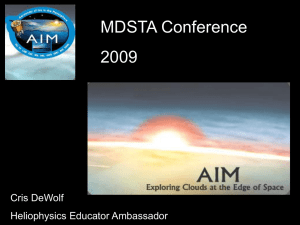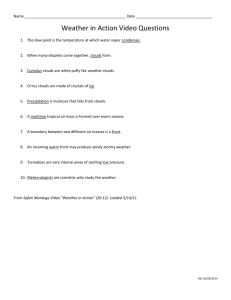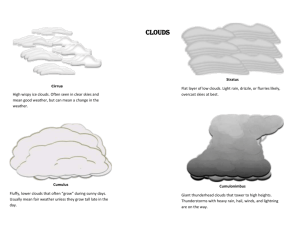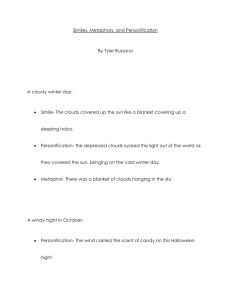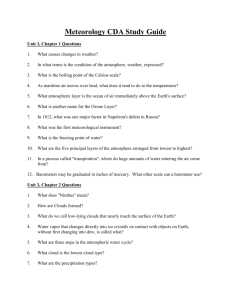What are Noctilucent Clouds
advertisement
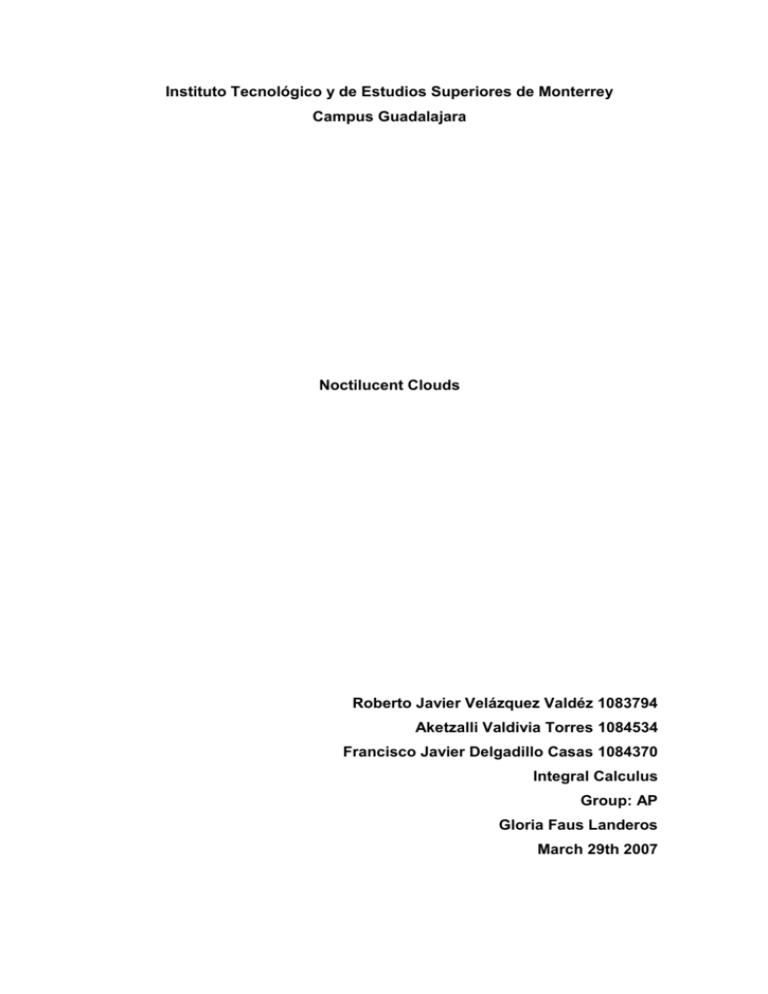
Instituto Tecnológico y de Estudios Superiores de Monterrey Campus Guadalajara Noctilucent Clouds Roberto Javier Velázquez Valdéz 1083794 Aketzalli Valdivia Torres 1084534 Francisco Javier Delgadillo Casas 1084370 Integral Calculus Group: AP Gloria Faus Landeros March 29th 2007 What are Noctilucent Clouds? Noctilucent clouds are a phenomena that have been seen since the 1800’s, especially during the summer in Alaska and in the northern areas of the world, like France. They appear in the mesosphere zone from 50 to 85 km; however, these fantastic clouds stay at an altitude of 80 to 85 km. The temperature of this layer of the earth can range from –125ºC to –163ºC, and furthermore, it is a very dry zone. There are many theories about these phenomena and one of the first ones was that they were the result of a big eruption caused by the Krakatoa volcano since these ashes reached a very high altitude. This theory was rejected because the clouds started to appear in other different places around the world. Nowadays, there are more Noctilucent Clouds in the world, but the main problem is that there is no specific cause and consequence of these, so they are still unknown for us. Problem Statement Our main objectives are the following: To analyze the different theories related to the causes of Noctilucent Clouds. To understand why they are seen more during the summer and in northern locations. To know how the solar rays enter the Earth; what their incident angle is, and how they are reflected during the summer in Alaska. To analyze how they contribute to the greenhouse effect. To think about the possible consequences of the Noctilucent Clouds. ** We are going to use Trigonometry, Calculus, Chemistry, Physics, Astronomy, Geometry, and other sciences in order to make a math model that represents this phenomenon that we can use to study and solve this enigma. Hypothesis The Noctilucent Clouds are harming the atmosphere because they contribute to the greenhouse effect. They provoke more damage during the summer because the sun’s rays are stronger during this season, specially in the northern industrialized countries of the world. For this reason, global warming is increasing, which contributes to the melting of the polar glaciers. Comparison between the possible components of Noctilucent Clouds and polluted clouds. Polluted Clouds H2O CO2 (Carbon Dioxide) Methane gas Nitrogen Oxide Ozone Clour flour Carbures NLC Methane gas=Ice Crystals Why do the sunrays heat stronger during the summer in Northern places? The inclination of the Earth is 23.5º. During summer the incident angle of the solar rays in the North Pole are bigger than in other seasons. When it is summer in the North Pole, it is winter in the South Pole, because of the incident angles of the sun’s rays. During this season in the North Pole, the days are longer. Summer. Because of the angle inclination of the Herat (23.5 º), during Summer the north places of the world are being heat more than the south places; for this reason, when is Summer in the North Pole, in the South Pole is Winter. Another important thing is that the incident angle of the solar rays is 30 º so that the rays hit more directed during this season. Incident Angle of the solar rays during summer. Some Important Theories Methane gas Production source: o Human activities o Germ from the rice crops. o Biomass o Digestion and defecation of the animals (cattle) o Residual water. o Anaerobic putrefaction. o Decomposition of organic matter. o Natural sources like marsh. o Extraction of fossil combustibles. Properties of Methane gas. Boiling point: -161.6ºC Melting point:: -182.5ºC Temperature of the mesosphere: –125º to –163º Given the high temperature of this zone of the Earth, the methane gas changes its internal composition for its physical properties. Furthermore, the density of the Methane gas is lower than the density of the air, so the methane gas can range very high altitudes. As a result, small crystal particles are formed. For this reason, the Noctilucent clouds shine very much. According to Vladimir Shaidurov of the Russian Academy of Sciences explained how changes in the amount of ice crystals at high altitude could damage the layer of thin, high altitude clouds found in the mesosphere that reduce the amount of warming solar radiation reaching the earth's surface. Meteorite’s theory It is thought that when a meteorite is falling down to the Earth, the cosmic dust stays in the mesosphere because it breaks apart and it forms small particles that form the Noctilucent Clouds; It is supposed that they are made of oxides of heavy metals. Water’s Theory This theory is focused that the water evaporates, and it stays in the mesosphere forming crystals of ice that later get together to form the Noctilucent Clouds. We reject this theory because the mesosphere is a dry zone, so it would be difficult that the evaporated water could reach up to this zone, and it is a place with low atmospheric pressure. For this reason, we reject this theory. Why do the solar rays contribute to the Greenhouse Effect? The solar rays are luminous energy. “The first law of the conservation for energy states that the energy can not be created, or destroyed, and that energy can be changed from one form to another”. Solar rays Luminous Energy Thermal Energy More Heat Greenhouse Effect Global Warming It is the same in a light bulb, since the luminous energy becomes in heat which is thermal energy. For this reason, when the thermal energy stays a lot of time in a place, it can cause a lot of problems since there could be an overheat, and this thermal energy can be expanded for other places. Possible Consequences Polar glaciers would melt. Ocean levels would increase, and as a result, many small islands would disappear. Many animal and vegetable species would disappear. Humans would have many problems, especially due to the variation of the weather. Other possible natural disasters could occur because of change in the weather. The amount of salt water in the oceans would increase. Conclusion Although the Noctilucent Clouds are attractive for human observation, they are a consequence of contaminants, which causes their influence on the greenhouse effect. Since the sun’s rays stay in specific points of the Earth holding heat and causing damages to human lives, we need to solve this important global problem. Bibliography Wikipedia. La Enciclopedia Libre. “Metano”. 11 Marzo de 2006 <http://es.wikipedia.org/wiki/Metano> Visited: March 10th, 2007. Stern P., David. Las Estaciones del Año. “Plan de Lección # 05”.09 de Septiembre de 2004 <http://www.phy6.org/stargaze/LMXseason.htm> Visited: March 10th, 2007. Stern P., David. El Ángulo de los Rayos del Sol. “Plan de Lección # 3ª” 13 de Diciembre de 2001. < http://www.phy6.org/stargaze/Msunangl.htm> Visited: March 10th, 2007. Stern P., David. Estaciones del Año. “Plan de Lección # 03” 13 de Diciembre de 2001. <http://www.phy6.org/stargaze/Mseasons.htm> Visited: March 10th, 2007. Consulta de Temas. < http://www.tutiempo.net/silvia_larocca/Temas/Consultas11.htm> Visited: March 10th, 2007. Campos, Nelia. Astrocantabria. Agrupación Astronómica Cántabra. “¿Qué es un Paherlio?” < http://www.astrocantabria.org/articulos/parhelios.html > Visited: March 10th, 2007. Atmósfera, Environment Canada. “Ángulos de Incidencia. Impactos en la Radiación UV-B” 2001. <http://www.puc.cl/sw_educ/contam/atm/atm11.htm> Visited: March 10th, 2007. Cuevas Ortiz, Antonio. Monografías. “La Luz”. <http://www.monografias.com/trabajos10/lalu/lalu.shtml> Visited: March 10th, 2007. Calipso. “Lasers in Space” August 18, 2006 <http://calipsooutreach.hamptonu.edu/mission.html > Visited: March 10th, 2007. Calipso. “The Sun Photometers”. August 18, 2006. <http://calipsooutreach.hamptonu.edu/sunphoto.html > Visited: March 10th, 2007. NASA, Earth´s Observatory. “How do aerosols affect clouds?” <http://earth.rice.edu/mtpe/atmo/atmosphere/topics/aerosols/aero_clouds .html > Visited: March 10th, 2007. Seinfeld, John. Caltech Research. “Current Seinfeld Group Research Program in Atmospheric Chemistry and Physics”. <http://www.che.caltech.edu/faculty/seinfeld_j/research.html> Visited: March 10th, 2007. University of Leicester Plone. “Is global warming down to humanity? Or are other factors at work?” < http://www2.le.ac.uk/ebulletin/news/pressreleases/2000-2009/2006/03/nparticle-bxh-khs-ykd > Visitada: 10 de Marzo de 2007.
